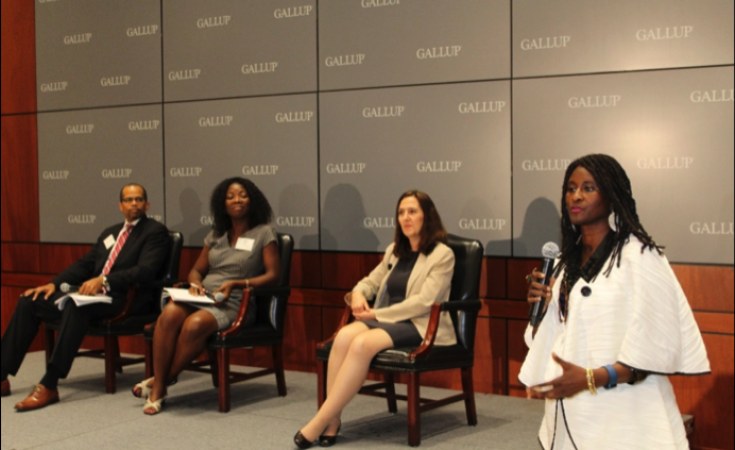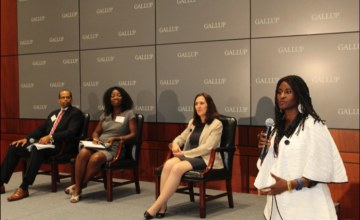FEEEDS Advocacy Initiative, Gallup, Allafrica.com, and GBGroup Global hosted a July 14, 2014 event in Washington, D.C., ahead of President Obama's second US-Africa Business Forum. The event highlighted the continent's leadership, investment environment and the role of the African Diaspora in Small and Medium Enterprise (SMEs) job creation.
Majorities in most countries approve of leadership
Majorities in 21 of the 28 African countries that Gallup surveyed in 2015 -- a year marked by elections across the continent -- said they approved of the job performance of their respective nation's president. Ratings were highest in Botswana, Burkina Faso and Kenya, where roughly four in five said they approved. Approval was lowest in the Democratic Republic of the Congo (28%) and Mauritania (32%).
More than a dozen national elections have taken place across the African continent since 2015, with some observers perhaps expecting to see more changes than they did. But ahead of the ballot, incumbent candidates enjoyed relatively high approval ratings and, in most cases, they were able to win another term. Leaders from new ruling parties succeeded in coming into power in Burkina Faso--where transitional President Michel Kafando was banned from running--and in Nigeria, where Muhammadu Buhari broke 16 years of consecutive rule by the People's Democratic Party (PDP).
Perceptions of corruption see gradual improvement across continent
Despite high levels of leadership approval, majorities in sub-Saharan Africa view corruption as widespread in the government (75%) and businesses (72%) in their countries -- two barriers to foreign investment in the resource-rich continent. However, these perceptions have improved modestly since 2008, when more than four in five African adults perceived corruption as widespread in both the public and private sectors. Perceptions of corruption in sub-Saharan Africa now rate slightly better than in Latin America and the Caribbean, where 77% see government corruption as widespread, and is on par with the average for post-Soviet states (74%).
Though Nigeria's embattled economy boasts abundant human and natural resources, more Nigerians say that corruption is widespread in their government (95%) than in any other country in sub-Saharan Africa. President Muhammadu Buhari -- elected last year on an anti-corruption platform -- has cracked down, but more needs to be done, a reality that the President has recently acknowledged himself in remarks at home and speeches in the U.S. and Britain. In Tanzania, which Gallup surveyed prior to President John Magafuli's election, nine in 10 (90%) view government corruption as widespread, staking a similarly difficult path for the country's new leader to fulfill campaign promises.
Rwanda stands apart from other countries in 2015, with fewer than one in 10 (7%) saying that corruption is widespread throughout their government. Rwanda's success in battling corruption is well-documented. In recent years, anti-corruption watchdog Transparency International reported Rwanda's corruption levels as "negligible," while the country's 'zero tolerance' corruption policy requires all high-ranking officials to declare assets on an annual basis.
More Prefer Jobs in Business than in Government
Even though perceptions of corruption in in sub-Saharan Africa's private sector remains high, many still say they would prefer to work in business (47%) than in the relative security of the public sector (35%). The preference to work in business is highest in Somalia (76%) where few government jobs exist and entrepreneurialism is high. A preference for private-sector employment is also high in Liberia (71%), Kenya (67%) and Botswana (66%), where all three populations have been among the most likely in the world to say they plan to start a business.
Majorities in only a handful of African countries state a preference for public-sector employment, including Mozambique (66%), Madagascar (59%), Rwanda (53%), and Cameroon (53%). In South Africa, where public-sector growth has exploded in recent years, government employment is preferred to the private sector by 48% to 43%.
With its business-friendly population and opportunities for market growth, African GDP and foreign direct investment (FDI) is increasing at a faster rate than any other region in the world. Still, corruption remains a serious impediment to outside investment, raising production costs and increasing uncertainty on future returns. According to the Mo Ibrahim Foundation, corruption in Africa costs the continent $148 billion per year, an amount equivalent to roughly 25% of GDP. Efforts to promote job creation in Africa's rapidly growing private sector need to come in tandem with strong policies promoting transparency and accountability. Increased investment in key African markets requires the kind of stable business environment and transparency that endemic corruption erodes.
Jay Loschky is Regional Director for Africa at Gallup.
Ambassador Dr. Robin Renee Sanders is CEO of the FEEEDS Advocacy Initiative and previously served as U.S. Ambassador to Nigeria and the Republic of Congo, and was U.S. Permanent Representative to the West African Regional Organization ECOWAS.



